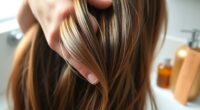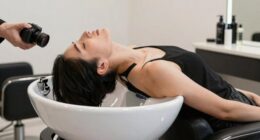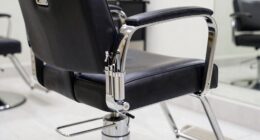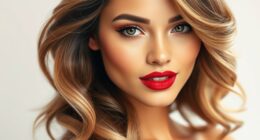Hair vitamins promise to solve hair loss woes, but their effectiveness is often exaggerated. They mainly help those with specific nutrient deficiencies, like biotin and iron. Most users without deficiencies won’t see significant benefits, as many supplements lack solid scientific backing. Over-supplementation can even lead to side effects, such as hair loss from too much vitamin A. To truly support your hair, understanding nutrients and lifestyle choices is key—stick around for more insights!
Key Takeaways
- Hair vitamins may benefit individuals with nutrient deficiencies, but lack scientific support for those without specific deficiencies.
- Common deficiencies linked to hair loss include biotin, iron, vitamin D, and zinc, which can be identified through blood tests.
- Over-supplementation of certain vitamins, like vitamin A, can actually lead to hair loss and other health issues.
- While some users report short-term benefits from hair vitamins, long-term effectiveness remains uncertain and requires more research.
- A balanced diet, hydration, and lifestyle changes are essential for maintaining healthy hair, often more so than supplements alone.
Understanding Hair Loss: Common Causes and Contributors

When it comes to hair loss, understanding the various causes can help you tackle the issue more effectively.
Hair loss, or alopecia, can stem from several contributors, including genetic factors like androgenetic alopecia and medical conditions such as inflammatory diseases. Nutrient deficiencies, particularly in vitamins and minerals, can also play a notable role. Additionally, incorporating omega-3 fatty acids into your diet may support overall hair health and combat hair loss. Furthermore, hydration and water intake are essential for maintaining healthy hair, as dehydration can exacerbate hair loss. It’s important to note that proper nutrition, including fiber-rich foods, can also contribute to overall health, which may indirectly benefit hair growth. For example, chia seeds are a great source of fiber and can promote satiety, helping to ensure you get the nutrients needed for healthy hair. Moreover, adopting data-driven decision-making in your dietary choices can help you identify which nutrients specifically aid in hair health.
Stress and emotional distress frequently accompany hair loss, affecting your self-esteem and overall mental health. Recognizing these factors is essential, as addressing underlying medical conditions or lifestyle changes can considerably improve your hair health.
The Link Between Vitamin and Mineral Deficiencies and Hair Loss

If you’re experiencing hair loss, it might be time to contemplate your nutrient intake.
Common deficiencies in vitamins and minerals, like biotin and iron, can considerably impact your hair health. Educational toys can also play a significant role in overall health, as engaging in creative play can enhance emotional well-being. Additionally, deficiencies in certain nutrients like vitamins A and E may also affect hair growth and strength. Furthermore, antioxidants found in various foods can combat oxidative stress, which is crucial for maintaining healthy hair. Incorporating meal replacement juices into your diet can also provide essential nutrients that support hair health.
Getting a blood test can help identify these deficiencies so you can take the right steps toward healthier hair. Additionally, the link between nutrient deficiencies and overall health can further clarify the importance of maintaining a balanced diet.
Common Nutrient Deficiencies
Several key nutrient deficiencies have been linked to hair loss, making it essential to understand their impact on hair health. Deficiencies in vitamin D, iron, and zinc are particularly common, with iron deficiency significantly affecting women. B vitamins, especially biotin, play an important role in maintaining healthy hair. A lack of vitamins A, C, E, and folate can also lead to poor hair condition. Recognizing these nutrient deficiencies can enhance awareness of soulmate angel numbers that may signify deeper connections in one’s life. Additionally, being aware of filial responsibility laws can help in addressing financial planning for health-related needs. Furthermore, the rise of sustainable fashion reflects a broader awareness of health, including nutritional aspects that contribute to overall well-being. Regular monitoring of nutrient levels can serve as a form of preventive maintenance for overall health and hair vitality. Additionally, maintaining a balanced diet rich in clean beauty ingredients can further support healthy hair growth.
| Nutrient | Effect on Hair Health |
|---|---|
| Vitamin D | Linked to certain hair loss types |
| Iron | Common deficiency, especially in women |
| Zinc | Critical for maintaining hair health |
Addressing these nutrient deficiencies through blood tests can be important for effective hair loss treatment and prevention.
Impact on Hair Health
Understanding the impact of vitamin and mineral deficiencies on hair health is essential for anyone experiencing hair loss. Nutrient deficiencies, particularly in vitamin D, iron, and biotin, can greatly affect your hair growth. For instance, low levels of vitamin D have been linked to hair thinning and poor hair follicle health. Glycolic acid can also play a role in promoting overall skin health, which is important for maintaining a healthy scalp. Additionally, using products with hydrocolloid technology can help maintain a healthy scalp environment, preventing issues that could contribute to hair loss. Furthermore, essential oils such as lavender oil are known for their mood enhancement properties, which can indirectly support hair health by reducing stress levels that may contribute to hair loss. Iron deficiency, often seen in women with hair loss, can contribute to conditions like telogen effluvium. Moreover, incorporating essential oils such as rosemary oil can further enhance scalp circulation and promote hair growth.
A 2016 study revealed that 38% of women facing hair loss were deficient in biotin, underscoring its importance in maintaining healthy hair. To combat these issues, consider incorporating hair growth supplements and focusing on a balanced diet rich in these crucial nutrients to support your hair health effectively. Additionally, regular practice of hairdressing techniques can enhance your understanding of how to care for your hair properly.
Importance of Blood Tests
How can a simple blood test reveal the hidden reasons behind your hair loss? Blood tests are essential for identifying deficiencies in important vitamins and minerals like vitamin D, iron, and biotin, all linked to hair loss. For instance, a study found that 38% of women with hair loss were deficient in biotin. Iron deficiency, especially common in women, can lead to telogen effluvium. By addressing these deficiencies through diet or supplements, you can help prevent hair loss and promote healthy hair growth. Additionally, early exposure to STEM education is crucial as it supports cognitive development, which can also play a role in overall health. Furthermore, juices rich in vitamins can also contribute to your overall nutrient intake, supporting hair health. Moreover, understanding the impact of new market dynamics in the cryptocurrency world can illustrate how financial stress may indirectly affect overall health and wellbeing.
| Nutrient | Deficiency Impact | Food Sources |
|---|---|---|
| Vitamin D | Hair follicle health | Fatty fish, eggs |
| Iron | Telogen effluvium | Red meat, spinach |
| Biotin | Hair thinning | Nuts, whole grains |
Effectiveness of Hair Vitamins: What Does the Science Say?
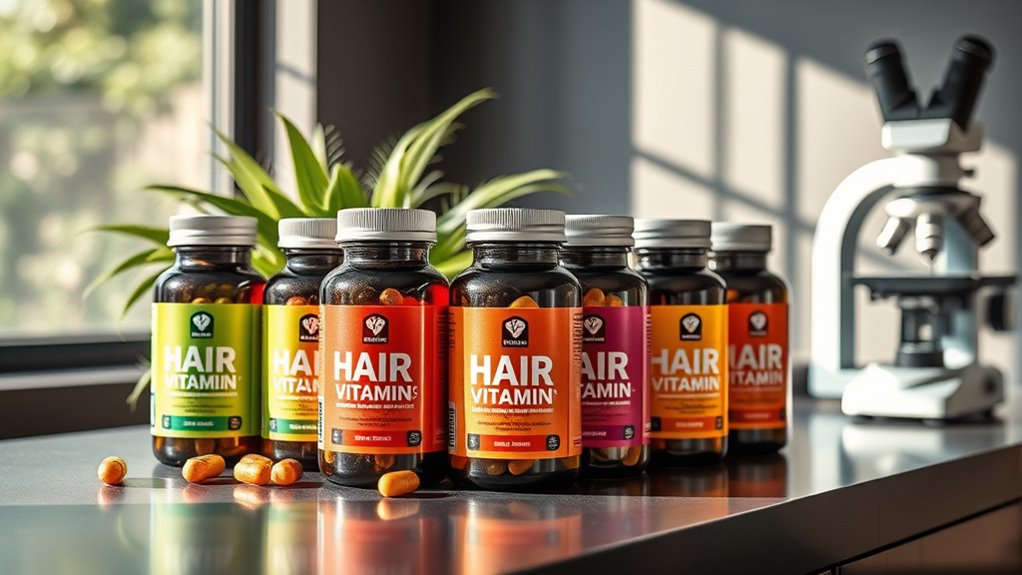
When it comes to hair vitamins, the science isn’t as clear-cut as you might hope.
Most studies show these supplements only help if you’re already deficient in certain nutrients.
Limited Clinical Evidence
While many people turn to hair vitamins in hopes of achieving thicker, healthier hair, the scientific backing for their effectiveness is limited.
Most studies show that hair vitamins mainly benefit those with existing nutrient deficiencies. For instance, a 2016 study revealed that 38% of women experiencing hair loss were deficient in biotin, suggesting supplementation may help this group.
Additionally, a 2013 study found lower iron levels in women with hair loss, pointing to the potential benefits of iron supplementation.
However, much of the research on hair vitamins is funded by supplement companies, raising concerns about reported efficacy.
Nutrient Deficiency Impact
Nutritional deficiencies greatly impact hair health, making it essential to understand the role of specific vitamins and minerals.
Deficiencies in vitamins A, C, D, and B vitamins like biotin, as well as minerals such as iron and zinc, have been linked to hair loss. For instance, a 2016 study revealed that 38% of women experiencing hair loss were deficient in biotin, highlighting its importance for healthy hair.
Iron deficiency, particularly common among women, can lead to telogen effluvium, resulting in increased hair shedding.
While vitamins may support hair follicle function, they won’t accelerate growth unless you have existing deficiencies. If you’re not deficient, supplementation typically won’t yield significant improvements in your hair health.
Long-Term Effectiveness Uncertainty
The long-term effectiveness of hair vitamins remains a contentious topic, as substantial peer-reviewed research is scarce.
While some clinical studies, like those for Nutrafol and Viviscal, show promising short-term results for thinning hair, the long-term benefits are still uncertain.
Most hair loss supplements, including biotin, lack scientific evidence to support their efficacy in individuals without deficiencies.
Ingredients like saw palmetto and collagen also need more research to validate their claims.
Additionally, since these supplements aren’t FDA-approved for treating hair loss, they don’t undergo rigorous testing.
Before starting any hair vitamin regimen, it’s wise to seek medical advice to ascertain it aligns with your specific needs and health conditions.
Nutrients Essential for Hair Health
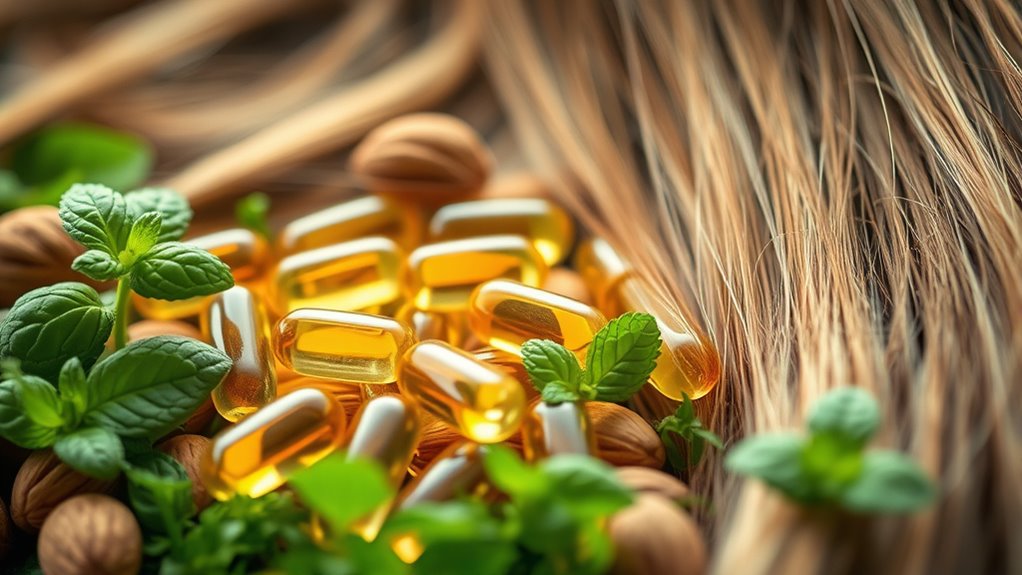
Healthy hair starts with the right nutrients. To maintain ideal hair health, you need a balanced intake of key vitamins and minerals.
Biotin, a B vitamin, is essential; a deficiency can lead to hair loss, as shown in studies where 38% of women with thinning hair lacked this vitamin.
Biotin is crucial for hair health; studies reveal 38% of women with thinning hair are deficient in this vital B vitamin.
Iron also plays an important role, as it helps transport oxygen to your hair follicles. Low iron levels have been linked to hair loss in women.
Additionally, vitamin D supports hair follicle development, so make sure you’re getting enough sun exposure or supplementation.
Incorporate colorful fruits, vegetables, whole grains, lean proteins, and healthy fats into your diet to prevent deficiencies and promote healthy hair growth.
Potential Side Effects of Hair Growth Vitamins

While hair growth vitamins can offer benefits, it’s important to be aware of potential side effects that may arise. Before diving into hair supplements, consider the following:
- Over-supplementation of certain nutrients, like vitamin A, might lead to hair loss instead of promoting growth.
- Some individuals may experience gastrointestinal issues, such as nausea or upset stomach, especially if they take excessive amounts.
- Hair vitamins can interact with prescription medications, making it essential to consult a physician before starting any new regimen.
Most people tolerate hair vitamins well, but those with specific health concerns should approach supplements cautiously.
Always prioritize your well-being and discuss any potential side effects with a medical professional to guarantee a safe and effective approach to hair health.
Recommendations for Supporting Hair Health Through Diet and Lifestyle

To truly support hair health, focusing on diet and lifestyle is just as important as considering supplements. A healthy diet rich in colorful vegetables, fruits, whole grains, lean protein, and healthy fats provides the essential nutrients your hair craves.
Certain vitamins, like A, C, D, and B vitamins, along with iron, selenium, and zinc, play significant roles in improving the health of your hair and reducing hair shedding.
Vitamins A, C, D, B, along with iron, selenium, and zinc, are crucial for healthy hair and reducing shedding.
Regular exercise, adequate sleep, and effective stress management are also essential for overall health, which directly supports hair growth.
If you’re unsure about your nutrient intake, consulting a healthcare professional can help identify specific deficiencies and guide you towards a balanced approach to nutrition that supports hair health effectively.
Frequently Asked Questions
Do Any Hair Vitamins Actually Work?
Hair vitamins can be a mixed bag when it comes to effectiveness. If you’re nutrient deficient, they might help—especially with ingredients like biotin, vitamin D, and zinc.
However, if you’re not lacking in these nutrients, you mightn’t see any real benefits. It’s essential to focus on a balanced diet for ideal hair health instead of relying solely on supplements.
Always consult with a healthcare professional to assess your specific needs before starting any regimen.
Are There Any Dangers in Taking Nutrafol?
When you step into the garden of supplements, Nutrafol might seem like a vibrant flower promising growth.
However, there are dangers lurking beneath the surface. You could experience gastrointestinal discomfort, allergies, or headaches.
If you mix it with other vitamins, you risk over-supplementation, which can lead to adverse effects.
Always consult a healthcare professional before starting Nutrafol, especially if you have existing health conditions or take prescription medications.
Your health deserves cautious care.
Does Vitamin a Really Help Hair Growth?
Yes, vitamin A really can help with hair growth. It’s essential for cell growth and keeps your hair follicles healthy.
When you get enough vitamin A, it promotes the production of sebum, which moisturizes your scalp and prevents dryness. Just be careful not to overdo it; too much vitamin A can actually lead to hair loss.
Incorporating foods like carrots, sweet potatoes, and spinach into your diet can help you maintain the right balance.
Is There Anything That Really Works for Hair Growth?
So, you want to grow a luscious mane overnight, huh? If only it were that easy!
While there’s no magic potion, focusing on a balanced diet with vitamins like D, iron, and zinc can help. You might also consider checking for deficiencies.
Sure, hair growth supplements are all the rage, but don’t hold your breath waiting for them to work miracles. Instead, stick to healthy eating and realistic expectations for your hair goals!
Conclusion
So there you have it—your hair’s not just crying out for those overpriced vitamins; it’s probably just tired of your questionable life choices! While a balanced diet can work wonders, you might want to save those flashy hair growth pills for your next TikTok video instead. Remember, healthier hair comes from nurturing your body, not just popping pills. So, grab that salad and let your luscious locks thrive—because who needs a magic potion when you’ve got good ol’ nutrition?

